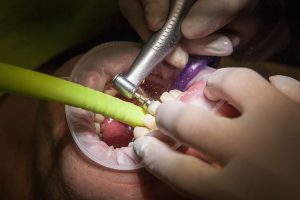Oral surgery refers to any surgical procedure in or around the mouth and jaw, usually done by a dental specialist trained to perform certain types of oral surgeries.
How many types of oral surgeries are there?
There are many types of oral surgeries, including surgical procedures such as tooth removal or root canal treatments. Some oral surgeries involve repositioning of the jaw. In other cases, oral surgery may include removal of a tumor. Oral surgeries can be carried out by different dental specialists, such as endodontists, periodontists, and prosthodontists.
What are the most common types of oral surgeries?
 These are some of the most common types of surgeries for teeth and jaw:
These are some of the most common types of surgeries for teeth and jaw:
- Impacted wisdom teeth
- Gum graft
- Dental implants
- Maxillofacial Surgery
- Root canal
- Jaw and teeth repair after injury
When do I need oral surgery?
For dental and mandibular procedures where the experience of a general dentist is not enough; you may need oral surgery. If you have impacted wisdom teeth, for example, you may need to see an oral surgeon remove them. If you suffer from gum disease and need a gum graft, you will be referred to a periodontist who is responsible for performing that type of surgery.
If you need oral surgery, your general dentist will talk to you and refer you to the right provider.
How do I prepare for oral surgery?
Preparation for oral surgery is the same as any other major medical procedure, depending on the type of surgery. Always make sure to follow your dentist’s directions.
- First, make sure your home is clean and tidy by the time you return, so you can be comfortable for a few days.
- Prepare your bed in case you need to stay in a tilted position.
- Follow your oral surgeon’s instructions. Generally, you will be asked not to drink or eat 8 to 10 hours before surgery.
- Coordinate the transportation that will take you back to your home, if necessary. Consult your oral surgeon about the type of anesthesia they will use. Some types of anesthesia inhibit the ability to drive.
What are some of the most important aspects of recovering from oral surgery?
The recovery from your oral surgery is very important to achieve the goals that you have established with your dentists. Do not smoke or drink alcohol after surgery, as this can delay your recovery. If you feel pain from the swelling, use ice to reduce the inflammation. Instead of brushing your teeth, rinse your mouth with salt water several times a day to kill bacteria.
What can I eat after oral surgery?
Soft food at room temperature is ideal for after oral surgery. Avoid using straw or eating hard, crunchy or chewy foods.
Oral surgeries are common and can be simple or complex. Prepare your place to have all the necessary comfort; make sure that someone takes you home and give yourself at least two days to heal. During that time, eat soft foods and rinse your mouth with salty water regularly.
